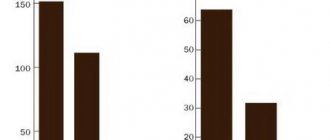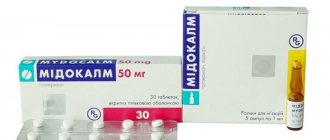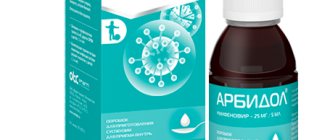Buy Fluimucil-antibiotic IT powder for injection 500 mg No. 3 in pharmacies
Brief description FLUIMUCIL ANTIBIOTIC is a mucolytic agent that thins sputum, increases its volume, and facilitates the separation of sputum.
Pharmacological action Thiamphenicol glycinate acetylcysteinate is a complex compound that combines the antibiotic thiamphenicol and the mucolytic acetylcysteine. After absorption of thiaminephenicol, glycinate acetylcysteinate is split into acetylcysteine and thiamphenicol. Thiamphenicol is a derivative of chloramphenicol, the mechanism of action is associated with inhibition of bacterial cell protein synthesis. Thiamphenicol has a wide spectrum of antibacterial action and is effective in vitro against bacteria that most often cause respiratory tract infections: gram-positive (Streptococcus pneumoniae, Corynebacterium diphtheriae, Staphylococcus spp., Streptococcus pyogenes, Listeria spp., Clostridium spp.) and gram-negative (Haemophilus influenzae, Neisseria spp., Salmonella spp., Escherichia coli, Shigella spp., Bordetella pertussis, Yersinia pestis, Brucella spp., Bacteroides spp.). Acetylcysteine, by breaking the disulfide bonds of mucoproteins, quickly and effectively dilutes sputum and pus, reduces their viscosity and promotes discharge. Acetylcysteine facilitates the penetration of the antibiotic thiamphenicol into lung tissue and inhibits the adhesion of bacteria to the epithelium of the respiratory tract.
Indications: diseases of the upper respiratory tract and ENT organs: exudative otitis media, sinusitis, laryngotracheitis; - diseases of the lower respiratory tract: acute and chronic bronchitis, prolonged pneumonia, lung abscess, emphysema, bronchiectasis, cystic fibrosis, bronchiolitis, whooping cough; — prevention and treatment of bronchopulmonary complications after thoracic surgery (bronchopneumonia, atelectasis); — prevention and treatment of obstructive and infectious complications of tracheostomy, preparation for bronchoscopy, bronchoaspiration; — with concomitant nonspecific forms of respiratory infections to improve drainage, including cavernous lesions, with mycobacterial infections. Method of administration and dosage Fluimucil® antibiotic IT is administered intramuscularly, used for inhalation, application, and cavity rinsing. Inhalation: adults - 250 mg 1-2 times a day; children - 125 mg 1-2 times a day. Endotracheal: through a bronchoscope, endotracheal tube, tracheostomy - 1-2 ml of solution (for adults, dissolve in 4 ml of water for injection - 500 mg of dry matter, for children - 250 mg). Locally: for administration into the paranasal sinuses, as well as for washing cavities after surgical interventions in the area of the nose and mastoid process, 1-2 ml of solution (for adults, dissolved in 4 ml of water for injection - 500 mg of dry matter, for children - 250 mg ). For diseases of the nasopharynx and ear, instill 2-4 drops into each nasal passage or external auditory canal. Intramuscularly: adults - 500 mg 2-3 times a day; children under 3 years old - 125 mg 2 times a day; 3-7 years - 250 mg 2 times a day; 7-12 years - 250 mg 3 times a day. For premature and newborn babies up to 2 weeks, the average dose is 25 mg/kg per day. If necessary, the dose can be increased by 2 times (in the first 2-3 days of treatment in particularly severe cases). Do not increase the dose in premature and newborn children, as well as in patients over 65 years of age. The course of treatment is no more than 10 days.
Side effects Allergic reactions. With intramuscular administration, a slight burning sensation at the injection site is possible, rarely - reticulocytopenia, anemia, leukopenia, neutropenia, thrombocytopenia. With inhalation administration - reflex cough, local irritation of the respiratory tract, stomatitis, rhinitis, nausea. Bronchospasm is possible, in which case bronchodilators are prescribed.
Contraindications - anemia; - leukopenia; - thrombocytopenia; - hypersensitivity to one of the components of the drug. With caution: with liver failure and chronic renal failure. In children of the first two years of life due to age-related characteristics of kidney function.
Overdose Symptoms: changes in bacterial flora, superinfections. It is possible that the side effects of the drug may increase (with the exception of allergic reactions). Maintenance therapy is recommended.
Special instructions During treatment, the peripheral blood picture should be monitored. If the number of leukocytes (less than 4 thousand/μl) and granulocytes (by more than 40%) decreases, the drug is discontinued. Fluimucil IT antibiotic solution should not come into contact with metal and rubber surfaces. Fluimucil® antibiotic IT does not affect the ability to drive vehicles and other mechanisms.
Interaction with other drugs The simultaneous administration of antitussives may increase sputum stagnation due to suppression of the cough reflex. It is not recommended to mix with other aerosol medications.
Storage conditions At temperatures from 15°C to 25°C. Keep out of the reach of children.
Shelf life: lyophilisate for the preparation of solution for injection and inhalation 500 mg (bottles) - 3 years; solvent: water for injection (ampoules) - 5 years; set - 3 years.
Compound
The drug belongs to complex antibiotics; it contains not only an antibacterial, but also a mucolytic component, which explains its effectiveness. Thiamphenicol is present in the medicine as an active ingredient. The component acts on many microorganisms.
Additionally, the medication contains acetylcysteine. In addition, the medicine contains auxiliary components in the form of water for injection, as well as disodium edetate. In different dosage forms, additional components may differ, but the basic composition remains unchanged.
In what form is it produced?
The drug Fluimucil marked IT is available only in two dosage forms - in the form of a lyophilized powder for the preparation of a solution, and also in the form of a ready-made solution. In the first case, the package contains 3 bottles of white powder, accompanied by 3 ampoules with a solvent in the form of water for injection.
The finished solution is also packaged in boxes of 3 ampoules, but they are made of dark glass and do not require the use of a solvent. The liquid is transparent and has an unpleasant odor that can be felt immediately after opening. It reminds me of the smell of spoiled eggs. It is worth noting that after preparing the solution from the lyophilisate, the smell is similar to the finished medicine.
Each box, along with the ampoules, contains instructions that describe in detail the properties of the medicine and the rules for its use. The price of the powder for preparing the solution is approximately 500 rubles. per pack of 3 ampoules. In Moscow and other large cities the cost is slightly higher. The finished solution in dark glass ampoules also costs about 450-550 rubles. for 3 pieces.
Side effects
In most cases, adverse reactions develop if the instructions are violated, if the dosage is exceeded on your own, or if the therapeutic course is extended.
The most common complications are the following:
- Nausea and vomiting not associated with food intake. The complication is associated with the penetration of drug vapors into the tissues of the respiratory organs. In this case, the patient receives symptomatic treatment, which eliminates the symptoms and normalizes the condition.
- Headache and dizziness also develop quite often. In this case, it is recommended to stop the procedure. In most cases, this is enough to improve the condition. If the symptom always appears during inhalation, it is recommended to discontinue the drug.
- A rash and redness on the skin is evidence of the development of an allergic reaction. It is recommended to immediately stop using the product and start taking antiallergic medications.
- Prolonged reflex cough caused by irritation of the mucous membrane of the respiratory tract. In this case, treatment is most often stopped because the condition may worsen.
- Swelling of the mucous membranes of the throat, causing attacks of suffocation. If such complications occur, treatment is stopped immediately, the patient is given hormonal drugs that quickly relieve swelling.
- Bronchospasm develops quite rarely and is manifested by increased frequency and difficulty breathing, and changes in skin tone. Assistance must be provided to the patient immediately, as the likelihood of death due to suffocation increases.
If any complication occurs, it is recommended to immediately stop using the product. Doctors prescribe symptomatic therapy, and if necessary, the patient is hospitalized.
Combination with other means
Fluimucil IT antibiotic for inhalation can be used in combination with other medications, since it is absorbed into the blood in small doses. When used simultaneously with Nitroglycerin, an increase in the effectiveness of the latter is observed.
If the drug is combined with drugs that contain codeine and suppress the cough reflex, the likelihood of sputum stagnation in the bronchi and lungs increases.
It is not recommended to use Fluimucil simultaneously with antibiotics from the tetracycline group, since the effect of all drugs is weakened. Combining the finished solution with other medications in the same form is not allowed. It is prohibited to add mucolytics in the form of a solution, as well as agents from another group, into the nebulizer chamber during the procedure.
Any combination of drugs with Fluimucil must be approved by a doctor.
Overdose
There have been no cases of overdose when using the drug for inhalation, since with this method of treatment the drug is not absorbed into the blood in a large volume.
In exceptional cases, patients develop swelling of the mucous membrane of the throat, paroxysmal cough, and rash on the skin. Sometimes patients report severe weakness and headaches, even migraines. If such symptoms occur, you should immediately stop using the product and consult a doctor to prescribe symptomatic treatment.
Storage conditions and periods
The shelf life of the drug from the date of its manufacture is 3 years. However, such long-term storage is allowed only if all conditions are met.
Storage temperature – from 15 to 250C. The medication should not be exposed to direct sunlight for a long time. You should also not keep the medicine in a place where it may get wet.
Contraindications
Despite the benefits and relative safety of the drug, it has contraindications that must be taken into account before starting a therapeutic course. Absolute contraindications include intolerance to the main or additional component of the drug, as well as a tendency to allergic manifestations.
In addition, the drug is not prescribed for severe kidney and liver diseases, as it can negatively affect the functioning of important organs. From a pharmacological point of view, the drug is not harmful to the body if used correctly. However, the antibacterial component can negatively affect health.
A relative limitation for prescribing the drug will be the recovery period after severe surgery or injury. For elderly patients with a history of heart failure, coronary heart disease or angina, the drug is prescribed less often and only under supervision.
Another strict contraindication is leukopenia and thrombocytopenia. Severe anemia will also be an obstacle to treatment. Fluimucil is not prescribed to children under 2 years of age with kidney and liver diseases, as it can lead to serious complications.


